Effective study techniques are not just habits—they are strategies grounded in cognitive science and educational psychology. Decades of research have shown that students who use structured, evidence-based methods can improve their academic performance by up to 50% in both comprehension and long-term retention. This article explores the most effective approaches for studying, highlighting the science behind each method and offering practical steps for implementation.
Definition of Study Techniques
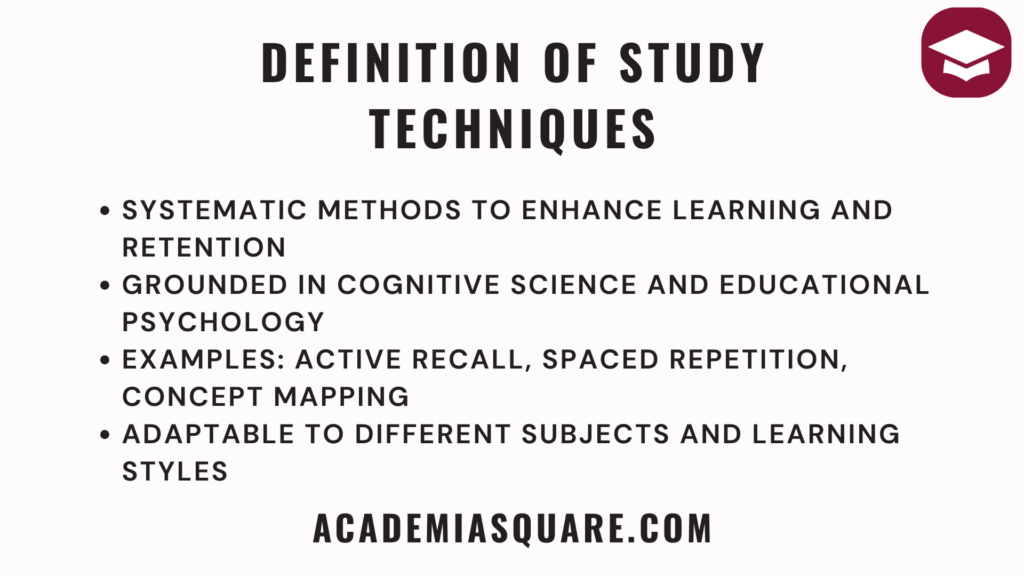
In the realm of academia, study techniques encompass a diverse array of systematic methods and approaches that students employ to enhance learning, improve understanding, and retain information effectively. These techniques are not merely routines but structured methodologies grounded in cognitive science and educational psychology, tailored to adapt to various learning styles and subject complexities.
For instance, active recall involves mentally retrieving information from memory, a process known to strengthen neural pathways associated with learning. This technique not only reinforces knowledge but also enhances retention and understanding of complex concepts.
Similarly, spaced repetition is based on the principle of reviewing material at intervals, optimizing long-term memory retention by strategically reinforcing information over time. This approach is particularly effective for mastering vocabulary, historical dates, and mathematical formulas.
Concept mapping, another valuable technique, visually organizes information into hierarchical diagrams, facilitating connections between ideas and promoting deeper understanding of relationships within a subject.
By grasping the intricacies of these techniques, students can refine their study habits, improve their ability to comprehend and apply knowledge across disciplines, and ultimately achieve academic excellence.
Most Effective Study Techniques and How to Use Them
- 🧠 Active Recall: Increases test performance by over 50% compared to passive review (Dunlosky et al., 2013).
- ⏳ Pomodoro Technique: Boosts productivity and focus during 25-minute sessions; reduces decision fatigue (Cognition Journal, 2014).
- 📅 Time Blocking: Enhances task completion rates and improves time awareness; shown to significantly reduce procrastination (Behavioral Science Research, 2020).
- 📖 SQ3R Method: Improves reading comprehension and recall through structured interaction with text; widely used in academic success programs.
- 📝 Blurting Method: Strengthens memory through retrieval practice; linked to 50% better long-term retention (Dunlosky et al., 2013).
Mastering various study techniques is essential for developing effective study habits and achieving academic excellence. While many students are aware of general strategies, understanding specific, research-backed methods can significantly enhance learning outcomes.
This section explores a range of study techniques categorized by their cognitive approach, time management structure, and learning purpose. Whether you’re preparing for an exam or striving to retain long-term knowledge, the following methods will give you a scientific edge.
Cognitive and Memory-Based Techniques
These methods are grounded in cognitive psychology and memory science. They focus on improving how information is processed, stored, and retrieved. Each technique is supported by empirical research and emphasizes active engagement with material.
Students who use these approaches tend to demonstrate higher retention, deeper understanding, and better transfer of knowledge across contexts.
Active Recall Studying Method
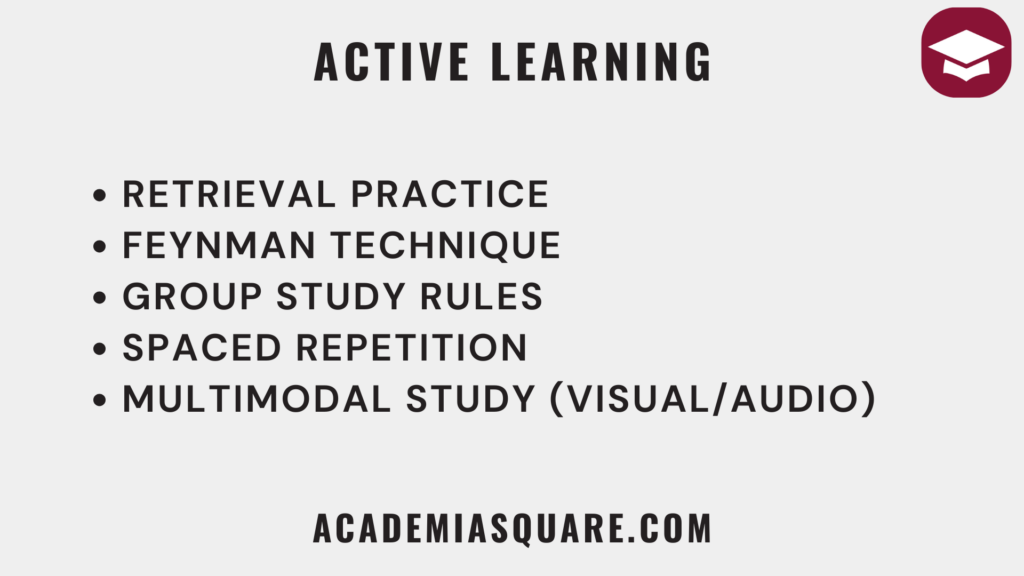
Active recall is a technique where you actively try to retrieve information from memory without looking at notes or books. It’s been proven to improve memory strength and understanding more than passive techniques like rereading.
According to research by Dunlosky et al. (2013), students using active recall scored over 50% higher on tests than those who only reviewed notes. It is considered one of the most powerful evidence-based learning strategies.
- Step 1: Study a topic or read a chapter thoroughly.
- Step 2: Close your book or cover your notes.
- Step 3: Write or speak everything you remember about the topic.
- Step 4: Check your answers and identify what you missed.
- Step 5: Review weak areas and repeat the recall exercise later.
Feynman Technique
The Feynman Technique is a learning method that promotes understanding by requiring the learner to explain concepts in their own words, as if teaching a beginner. This forces simplification and clarity, which exposes gaps in comprehension and facilitates deeper learning.
Research supports that “teaching to learn” improves retention and engagement. It enhances neural connections by transforming passive review into active synthesis, making it highly effective for technical or complex subjects.
- Step 1: Choose a concept or topic you want to learn.
- Step 2: Write an explanation of the concept as if you’re teaching it to someone with no prior knowledge.
- Step 3: Identify areas where your explanation is lacking or unclear.
- Step 4: Go back to the source material to review those gaps.
- Step 5: Refine and simplify your explanation until it’s crystal clear.
Method of Loci
The Method of Loci, or memory palace technique, enhances recall by associating pieces of information with physical locations you mentally navigate. By leveraging spatial memory, the brain creates strong contextual cues that make recall more vivid and structured.
A 2017 study in Neuropsychologia found that using the Method of Loci led to a 30–40% improvement in recall compared to rote learning. It’s particularly useful for memorizing lists, speeches, or sequences.
- Step 1: Visualize a familiar location (e.g., your house).
- Step 2: Identify specific, sequential “stops” or landmarks in this location.
- Step 3: Associate each piece of information with a specific stop.
- Step 4: During recall, mentally walk through the space and retrieve the information placed at each stop.
- Step 5: Practice the walk until it becomes fluent and the associations stick.
Rote Learning
Rote learning involves memorizing information through continuous repetition, typically without focusing on meaning. While it’s often seen as outdated, it remains valuable for foundational facts such as vocabulary, formulas, or dates.
Studies indicate rote learning is most effective when combined with spaced practice and mnemonic devices. It is less helpful for complex reasoning tasks but useful for building a base of core knowledge.
- Step 1: Select factual content you need to memorize (e.g., terms, formulas).
- Step 2: Repeat the content out loud or in writing several times.
- Step 3: Use flashcards or apps for regular drills.
- Step 4: Schedule reviews using spaced repetition intervals.
- Step 5: Test yourself frequently to reinforce memorization.
Cognitive Learning Theory
Cognitive learning theory emphasizes internal mental processes like reasoning, memory, and problem-solving. It encourages learners to actively interpret and organize new information, promoting meaningful learning rather than rote memorization.
According to the American Psychological Association, strategies based on cognitive learning—such as reflection and metacognition—can improve retention by up to 30%. These methods foster autonomy and transfer skills across different learning scenarios.
- Step 1: Connect new concepts to prior knowledge or real-life experiences.
- Step 2: Organize material using mental maps or diagrams.
- Step 3: Reflect on what strategies helped or hindered learning.
- Step 4: Adapt study approaches based on feedback and outcomes.
- Step 5: Engage in discussions or teaching to reinforce understanding.
Time and Productivity Strategies
Time management plays a crucial role in effective studying. Structured schedules, focused intervals, and strategic breaks help students reduce procrastination, increase productivity, and enhance concentration.
The following methods are designed to optimize how you manage your time while studying, ensuring that your cognitive resources are used efficiently for learning and retention.
Pomodoro Technique (25/5 Method)
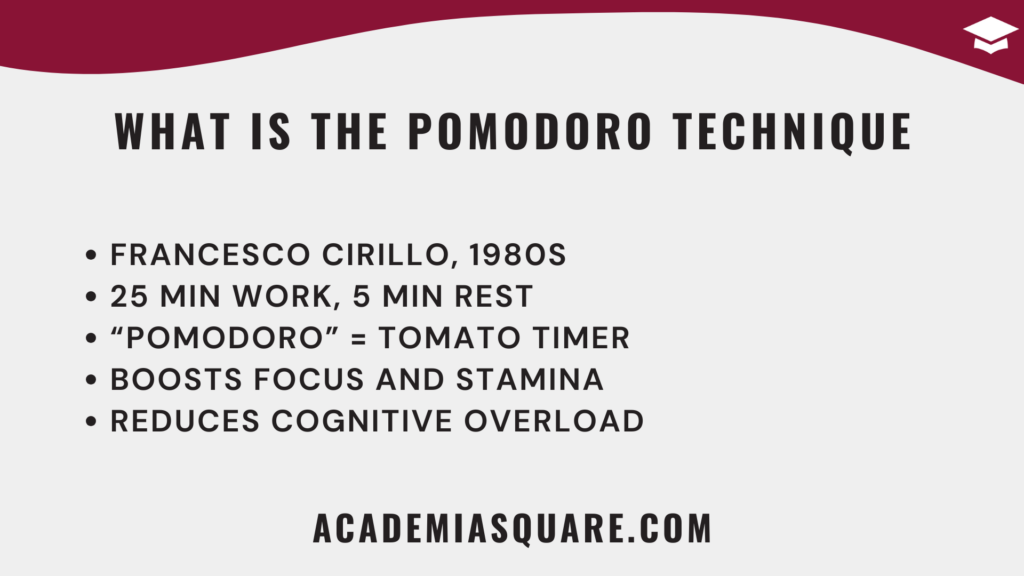
The Pomodoro Technique involves working in focused 25-minute intervals followed by short 5-minute breaks. These time blocks help prevent burnout and maintain concentration over extended periods. After four “Pomodoros,” you take a longer 15–30-minute break.
According to a 2014 study in the journal Cognition, short breaks significantly improve mental agility and prevent decision fatigue. This method is widely used in academic and professional settings for its simplicity and effectiveness.
- Step 1: Choose a specific task to work on.
- Step 2: Set a timer for 25 minutes and focus only on that task.
- Step 3: When the timer rings, take a 5-minute break.
- Step 4: Repeat this cycle four times.
- Step 5: After the fourth session, take a longer break of 15–30 minutes.
Time Blocking
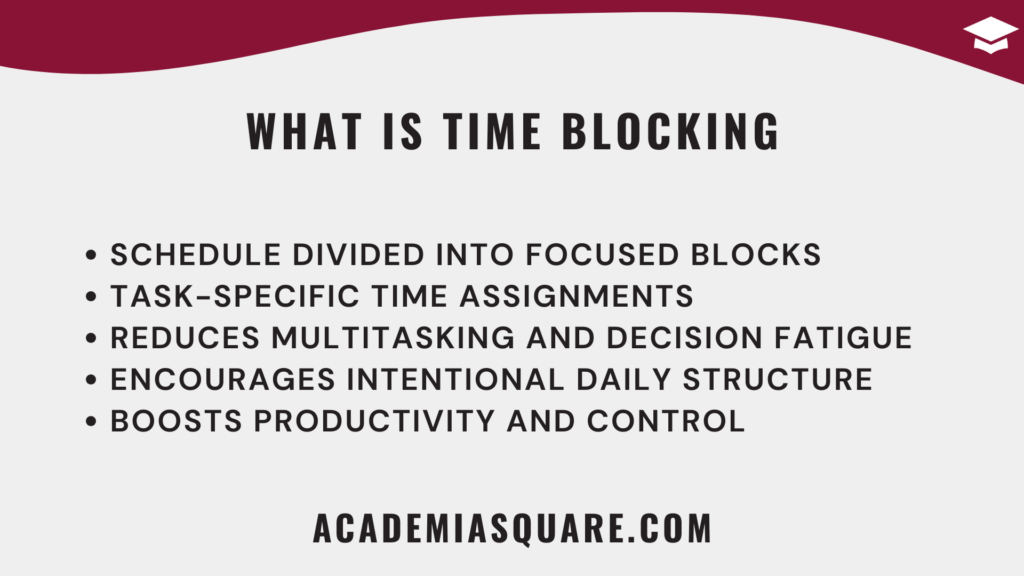
Time blocking involves planning your entire day by assigning specific blocks of time to different tasks or types of work. Unlike to-do lists, it forces you to commit to a plan and stick to a timeline, reducing decision fatigue and distraction.
Studies have shown that students using time blocking are significantly more likely to complete their tasks compared to those using unstructured study plans. It fosters discipline, limits procrastination, and improves task focus.
- Step 1: List out all tasks you need to complete for the day or week.
- Step 2: Allocate a time block for each task in your calendar.
- Step 3: Include buffer time between tasks for transitions and breaks.
- Step 4: Follow the schedule strictly and adjust as needed for interruptions.
- Step 5: Reflect at the end of the day to refine your next block schedule.
Spacing / Distributed Practice
Spacing—also known as distributed practice—is a scientifically supported method where study sessions are spread out over time rather than crammed into one session. This combats the “forgetting curve” and strengthens long-term memory.
According to research by Cepeda et al. (2006), spacing increases retention by up to 80% compared to massed practice. It’s especially effective for learning vocabulary, equations, and complex concepts that require multiple exposures.
- Step 1: Break study material into smaller chunks.
- Step 2: Schedule sessions to revisit material over increasing intervals (e.g., 1 day, 3 days, 1 week).
- Step 3: Use flashcards or apps like Anki to automate review cycles.
- Step 4: Focus each session on retrieval rather than re-reading.
- Step 5: Periodically test yourself on older material to reinforce long-term storage.
Repetitive Learning Method
Repetitive learning involves continuous review and re-exposure to material until it is fully memorized or understood. It is similar to rote learning but usually involves conscious refinement and active engagement during repetitions.
This method can be time-intensive but works well when combined with other techniques like active recall or spaced repetition. It is useful for subjects that require mastery of large volumes of factual information.
- Step 1: Read or study the material thoroughly.
- Step 2: Revisit the same content multiple times over several days.
- Step 3: After each repetition, summarize the content in your own words.
- Step 4: Test yourself regularly to reinforce memory.
- Step 5: Integrate feedback from quizzes or practice questions into your review sessions.
Reading and Comprehension Frameworks
Reading strategies are essential for students who need to absorb, understand, and retain large volumes of text-based information. These methods go beyond simple reading by incorporating structured approaches that enhance focus, comprehension, and memory.
These frameworks have been validated through educational research and are particularly useful for textbook learning, exam prep, and processing academic articles or theoretical materials.
SQ3R
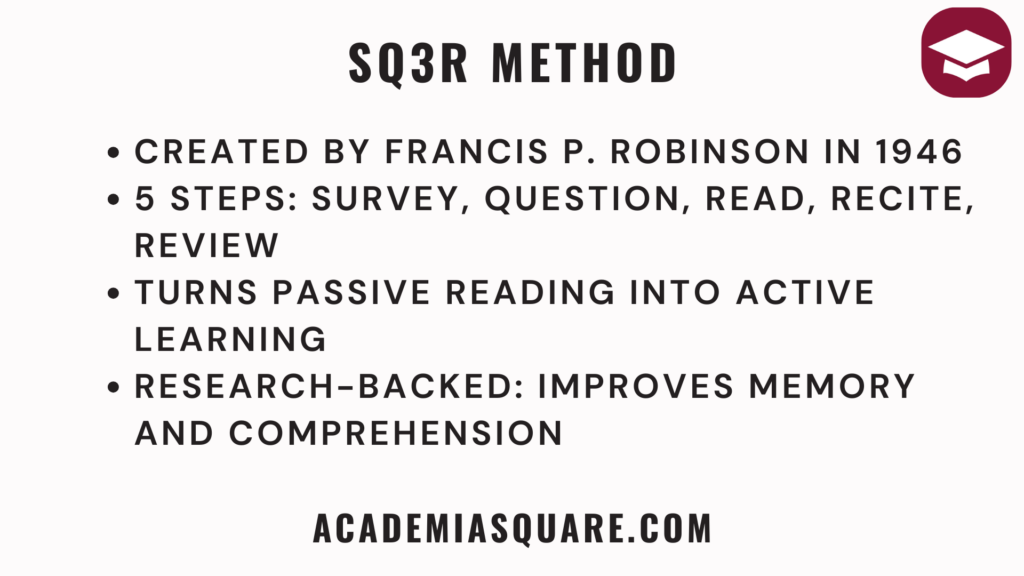
SQ3R stands for Survey, Question, Read, Recite, Review. It’s a time-tested reading strategy that fosters comprehension by encouraging learners to interact with the text in five clear stages. This method supports active learning and reduces passive reading behaviors.
Educational research indicates that the SQ3R method can improve test performance and reading retention, particularly when applied consistently. It’s widely recommended in academic success courses and study skills training.
- Step 1: Survey the material by skimming headings, subheadings, and summaries.
- Step 2: Create questions based on the titles or content previews.
- Step 3: Read actively to answer your questions.
- Step 4: Recite key points aloud or in writing without referring to the text.
- Step 5: Review the material by summarizing or quizzing yourself again.
REAP Method
The REAP Method stands for Read, Encode, Annotate, and Ponder. It encourages students to actively engage with reading material by rephrasing it in their own words, annotating the text, and reflecting on its meaning. This method promotes critical thinking and long-term retention.
One notable study confirming the REAP Method’s effectiveness was conducted at Carnegie Mellon University in 2007. Researchers Christine M. Feeney and Michael Heilman examined the relationship between students’ performance on automatically generated comprehension questions (which focus on surface-level understanding) and manually created questions (designed to assess deeper comprehension). The study found a statistically significant correlation between the two types of questions, suggesting that the REAP strategy can definitely help learners engage with text more meaningfully and build deeper understanding.
- Step 1: Read the passage carefully to get the general idea.
- Step 2: Encode by writing a brief summary in your own words.
- Step 3: Annotate the margins with key points, questions, or reactions.
- Step 4: Ponder the meaning by reflecting on implications or connections to other topics.
- Step 5: Review your notes and summaries for clarity and depth of understanding.
PQRST Method
The PQRST Method (Preview, Question, Read, Summarize, Test) is a structured technique for active reading. It helps students engage with texts through intentional inquiry and self-testing, which enhances memory encoding and application.
Studies have found that generating questions before reading increases retention and comprehension. PQRST also aligns well with metacognitive learning practices, making it ideal for self-directed learners.
- Step 1: Preview the text to get a sense of structure and key topics.
- Step 2: Formulate questions based on headings and introductory sections.
- Step 3: Read the content actively, looking for answers to your questions.
- Step 4: Summarize the main points in your own words.
- Step 5: Test yourself on the material using flashcards or review questions.
Note-Taking Methods
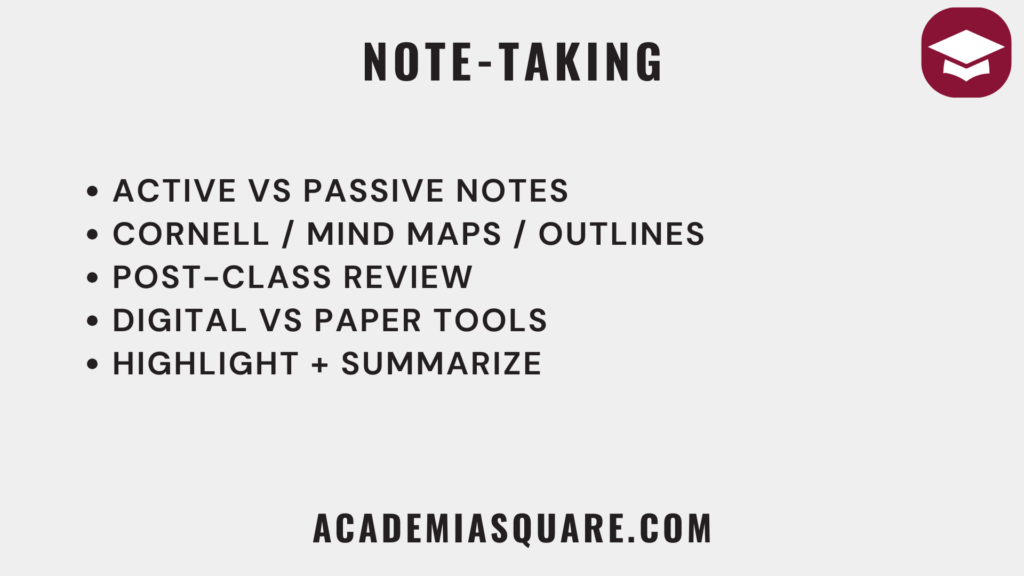
Effective note-taking is more than copying information—it’s about organizing ideas in a way that enhances understanding and memory. Different note-taking methods suit different types of content, learning styles, and academic disciplines.
Scientific research supports structured note-taking as a tool for improving recall and comprehension. The following methods help learners condense material, draw connections between concepts, and retain information more effectively.
Blurting Method
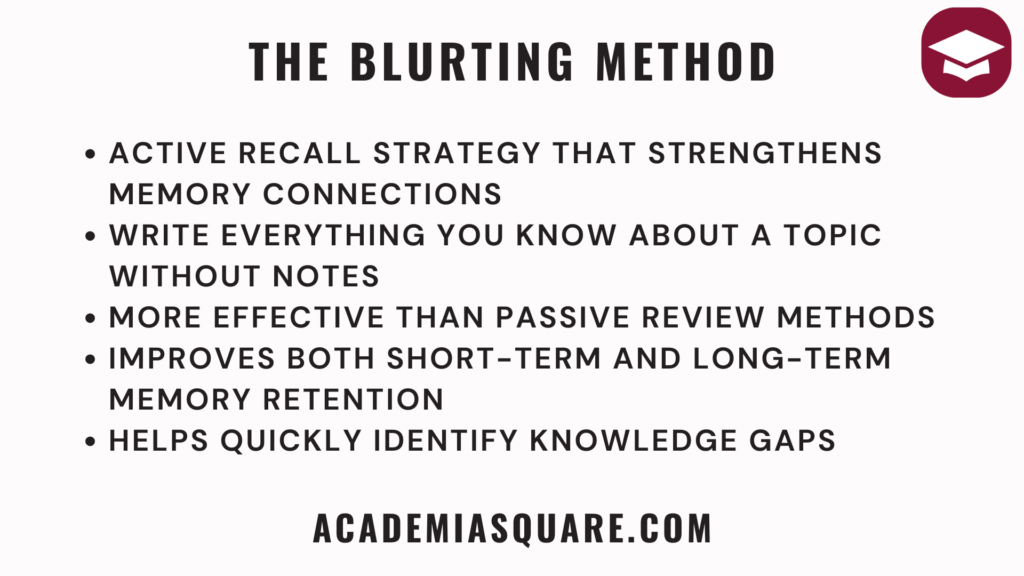
The blurting method is a form of active recall in which students write everything they remember about a topic from memory, without looking at notes. It helps reinforce memory and reveal areas that need more focus.
Though informal, this method aligns with retrieval practice theories and is particularly effective when used just before a quiz or exam. It forces the brain to reconstruct knowledge, which strengthens memory pathways. The blurting method is linked to improvements in long-term retention of up to 50%, based on findings like those from Dunlosky et al. (2013) on retrieval practice.
- Step 1: Choose a topic or chapter you’ve studied.
- Step 2: On a blank sheet, write down everything you remember without checking your notes.
- Step 3: Once done, compare your blurts with the actual notes.
- Step 4: Highlight gaps or errors and revise those areas.
- Step 5: Repeat the blurting process in future sessions to track progress.
Outlining Method
The outlining method organizes information hierarchically, with main topics followed by subpoints and supporting details. It’s ideal for subjects with clear structures like history or law, where ideas flow logically from one to another.
According to research from Cornell University, students who outline while listening or reading retain more and are better able to identify main ideas. This method promotes clarity, structure, and review efficiency.
- Step 1: Begin with the main topic at the left margin.
- Step 2: Indent subtopics underneath, using bullet points or numbers.
- Step 3: List supporting facts or examples under each subtopic.
- Step 4: Keep indentation consistent to show relationships.
- Step 5: Review and reorganize your outline after the session to reinforce structure.
Mapping Method
The mapping method (also known as mind mapping) uses visual diagrams to represent concepts and their relationships. This technique is especially helpful for brainstorming, planning essays, or understanding interconnected ideas.
Research shows that visual learning strategies like mapping improve comprehension and recall by engaging both hemispheres of the brain. It supports associative thinking and is favored by visual and creative learners.
- Step 1: Write the central topic in the middle of the page.
- Step 2: Draw branches for major subtopics outward from the center.
- Step 3: Add smaller branches with details or examples under each subtopic.
- Step 4: Use colors, arrows, or symbols to show connections and emphasis.
- Step 5: Review the completed map and explain the relationships aloud.
Chart Method
The chart method involves organizing notes in columns or rows, making it easy to compare and contrast information. It’s best suited for subjects like biology, economics, or history, where comparing data sets is essential.
Studies on tabular learning formats indicate that charts increase speed of reference and reduce cognitive load when dealing with large datasets. They are particularly helpful for exams that require factual comparison.
- Step 1: Draw a table or grid on your page with multiple columns.
- Step 2: Label each column with a category (e.g., Date, Event, Significance).
- Step 3: As you study, fill in the rows with corresponding information.
- Step 4: Use consistent formatting to make scanning easier during review.
- Step 5: Highlight patterns or outliers across the rows to aid memory.
Sentence Method
The sentence method involves writing every new idea or piece of information as a separate sentence. It’s quick and linear, making it ideal for fast-paced lectures where structure may not be obvious in real time.
This method captures a large volume of information but may require reorganization after class. It’s often used as a first-pass capture method before converting into outlines or charts.
- Step 1: Write down each new idea or fact as its own sentence.
- Step 2: Start each sentence on a new line for clarity.
- Step 3: Use abbreviations and shorthand to increase speed.
- Step 4: After class, reread and group related sentences.
- Step 5: Summarize grouped sentences into structured notes for review.
Cornell Note-Taking Method
The Cornell Method is a structured note-taking system developed at Cornell University. It divides the page into three distinct sections: a cue column, a note-taking area, and a summary section. This format encourages active engagement with content during and after the lecture, improving comprehension and retention.
Studies show that students who use structured formats like the Cornell Method recall 30–40% more material compared to those using unstructured notes. It’s especially effective in lecture-heavy courses and promotes reflective review and self-testing.
- Step 1: Divide your paper into three sections: a narrow left column (cue), a wider right column (notes), and a bottom row (summary).
- Step 2: During the lecture, use the right column to jot down key points, facts, and details.
- Step 3: After class, fill in the left column with questions, keywords, or cues based on your notes.
- Step 4: Write a brief summary at the bottom of the page, highlighting the main ideas of the session.
- Step 5: Review your notes regularly by covering the right column and testing yourself with the questions or cues from the left.
Black-Red-Green Method
The Black-Red-Green (BRG) Method is a color-coded note-taking system designed to help students organize thoughts across three layers of cognition: factual information (black), critical insights or questions (red), and personal reflections or applications (green). By using three colors consistently, learners can visually distinguish between what they learn, what they think about it, and how it connects to their broader understanding.
Although formal scientific studies on the BRG method are limited, the technique draws on principles from dual coding theory and metacognitive strategy research, both of which have been shown to improve learning outcomes. Students using structured color cues tend to engage more actively during review and demonstrate stronger recall and deeper comprehension.
- Step 1: Use a black pen to record objective facts, definitions, and main points during lectures or reading.
- Step 2: Immediately or shortly after, add critical questions, inferences, or clarifications in red ink.
- Step 3: Use green ink to write your own thoughts, examples, analogies, or connections to prior knowledge.
- Step 4: During review, scan each color independently to engage different levels of thinking.
- Step 5: Use the green notes as springboards for essays, reflections, or discussions to reinforce personal understanding.
How to Choose the Right Study Techniques
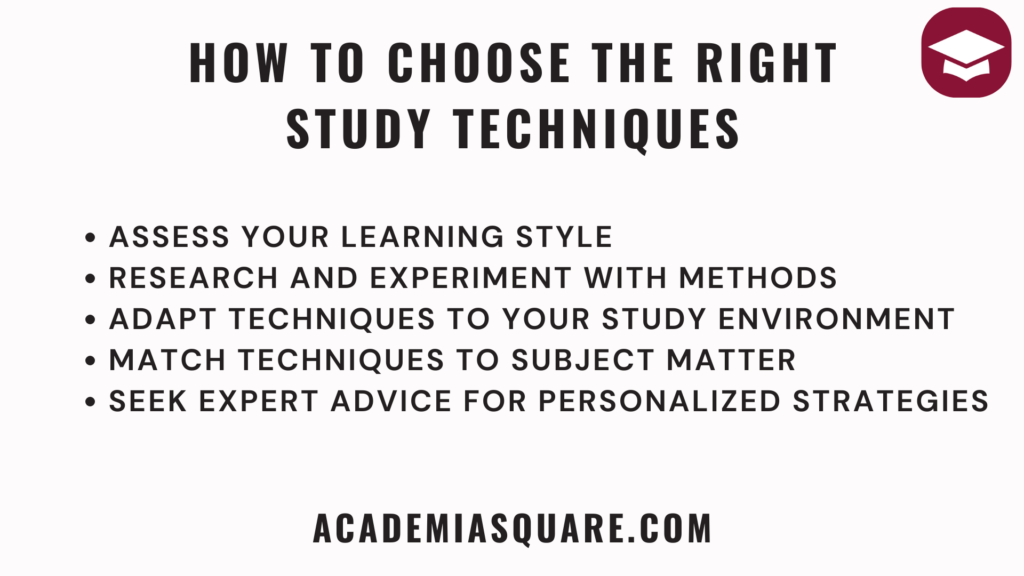
When selecting study techniques, it’s essential to consider various factors that influence their effectiveness for individual learning styles and academic goals. Here’s an in-depth guide to help you:
- Assess Your Learning Style: Identify whether you are a visual, auditory, kinesthetic, or reading/writing learner. Understanding your predominant learning style allows you to prioritize techniques that align with how you best absorb and retain information.
- Research Different Techniques: Explore a range of methodologies such as the Pomodoro Technique, active recall, mind mapping, and the Feynman Technique. Each method offers distinct benefits, from enhancing focus and memory consolidation to fostering critical thinking and problem-solving skills.
- Consider Your Study Environment: Evaluate the environment where you study most effectively. Whether you thrive in quiet spaces, collaborative settings, or utilize digital tools, adapting your techniques to suit your preferred study environment optimizes learning outcomes.
- Align Techniques with Subject Matter: Recognize that different subjects may require specific approaches. For instance, scientific disciplines may benefit from hands-on experimentation and visualization techniques, whereas humanities subjects may necessitate textual analysis and argumentation skills.
- Seek Expert Guidance: Consult educators, academic advisors, or reputable resources like effective study techniques guides. Their insights can provide valuable recommendations tailored to your academic challenges and goals.
By tailoring your approach based on these considerations, you can maximize the effectiveness of your study sessions, improve information retention, and enhance overall academic performance.
Moreover, integrating adaptive learning strategies such as gamification and collaborative learning environments fosters engagement and motivation, making studying a dynamic and rewarding experience.
Advantages of Using Study Techniques
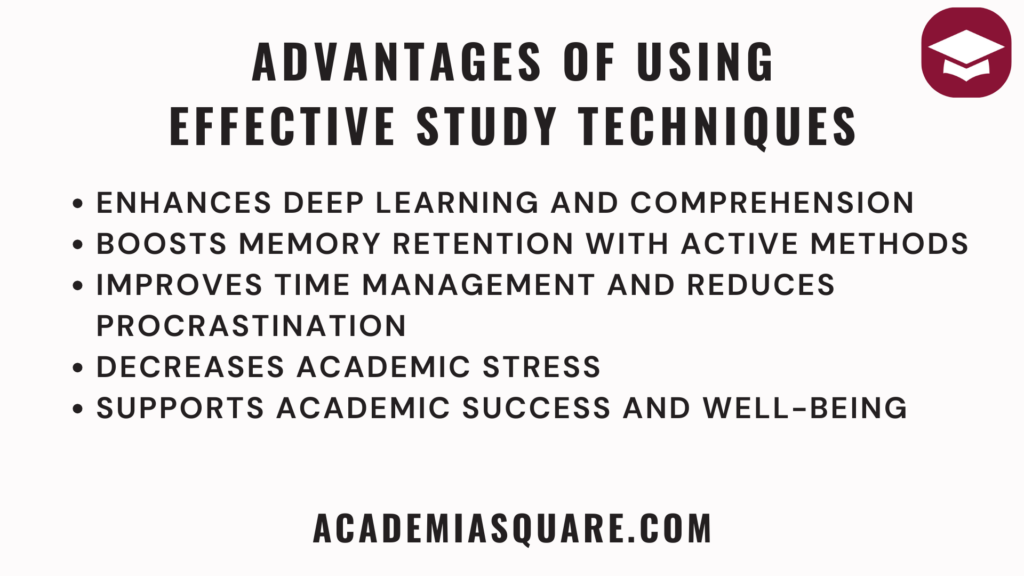
Implementing structured study techniques yields significant advantages that optimize academic performance and student success:
- Enhanced Learning: Techniques like active learning and concept mapping promote deeper comprehension by encouraging active engagement with course material. Active learning methodologies, such as group discussions and problem-solving activities, facilitate application of knowledge to real-world scenarios.
- Improved Retention: Strategies such as spaced repetition and mnemonic devices bolster long-term memory retention, ensuring mastery of key concepts beyond immediate study sessions. Mnemonics, such as acronyms and visual imagery, provide effective memory aids for recalling information during exams and assignments.
- Optimized Time Management: Efficient methods like the Pomodoro Technique and time blocking enhance study session productivity by structuring focused work intervals and incorporating strategic breaks. These techniques mitigate procrastination and optimize concentration levels during study periods.
- Reduced Academic Stress: Organized study techniques mitigate stress associated with academic demands by establishing clear goals, structured study schedules, and effective time allocation. Stress management practices, including mindfulness exercises and relaxation techniques, foster mental well-being during intensive study periods.
These benefits not only elevate academic performance but also cultivate a balanced and fulfilling student experience. By integrating effective study techniques into your academic routine, you empower yourself with essential tools to navigate challenges confidently and achieve academic excellence.
Furthermore, embracing interdisciplinary approaches that integrate physical activity, nutrition, and holistic well-being with study routines enhances cognitive function and overall academic resilience.
Improving Concentration and Focus
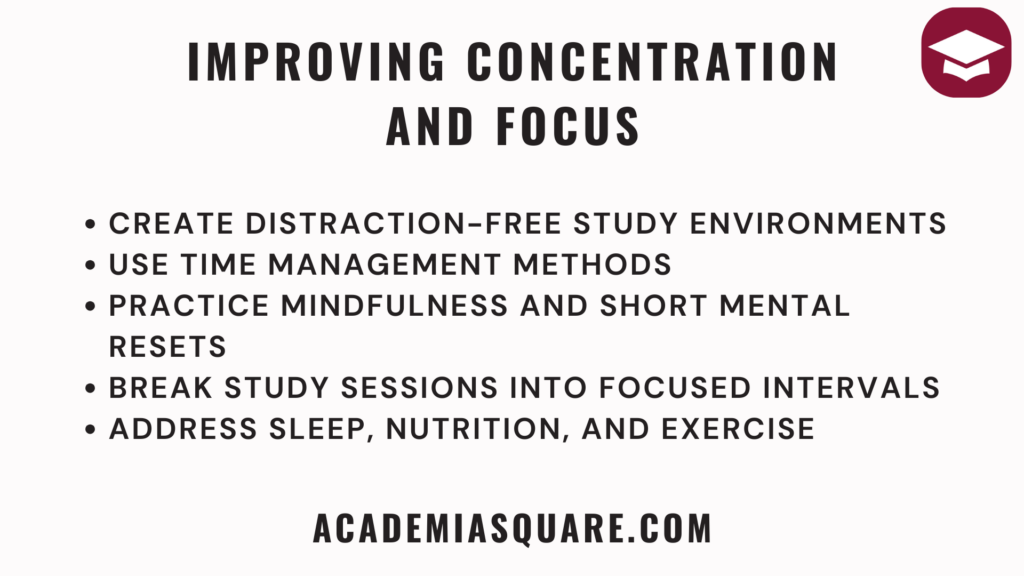
Enhancing concentration and focus during study sessions is crucial for optimizing learning outcomes. The ability to maintain sustained attention allows for deeper engagement with study material and enhances retention. Here are comprehensive strategies to improve concentration:
- Minimize Distractions: Create a conducive study environment by eliminating distractions such as phones, social media, and clutter. Designate a quiet space dedicated solely to study to promote focused attention and productivity.
- Practice Mindfulness: Incorporate mindfulness techniques into your study routine to cultivate present-moment awareness and mental clarity. Techniques like deep breathing exercises, guided meditation, or progressive muscle relaxation can help reduce stress and improve concentration.
- Utilize the Pomodoro Technique: Structure study sessions using the Pomodoro Technique, which involves working in focused intervals (typically 25 minutes) followed by short breaks (5 minutes). This method optimizes productivity by leveraging time constraints and allowing for periodic rest, preventing burnout and enhancing overall focus.
- Set Clear Study Goals: Define specific study objectives and prioritize tasks based on importance and urgency. Breaking down study sessions into manageable goals provides a sense of direction and accomplishment, fostering motivation and sustained concentration.
- Practice Active Listening: Actively engage with lecture material or reading assignments by taking detailed notes and asking questions. Active listening promotes active learning and facilitates information retention by encouraging critical thinking and analysis.
- Maintain Physical Well-being: Prioritize regular physical exercise and maintain a balanced diet to support cognitive function and mental stamina. Physical activity promotes blood flow to the brain, enhances mood, and reduces stress, contributing to improved focus and overall academic performance.
Implementing these strategies consistently enhances your ability to concentrate effectively during study sessions, leading to improved comprehension, retention, and academic success. By integrating mindfulness practices, structured study techniques, and holistic well-being strategies, you cultivate a balanced approach to learning that supports long-term academic goals.
Furthermore, establishing a consistent study routine and incorporating periodic breaks and rewards fosters sustainable productivity and prevents mental fatigue. Developing strong concentration skills equips you with essential tools to navigate academic challenges with confidence and efficiency.
How to Maintain Motivation
Maintaining motivation throughout study sessions is essential for sustaining productivity and achieving academic goals. Effective strategies can help you stay focused and motivated:
- Set Realistic Goals: Break down larger tasks into smaller, manageable goals. Setting achievable milestones provides a sense of accomplishment and encourages continuous progress.
- Engage with Support Networks: Seek support from friends, family, or study groups. Surrounding yourself with positive influences and like-minded individuals fosters motivation, encouragement, and accountability.
- Visualize Success: Create a mental image of achieving your study goals. Visualizing success enhances motivation by reinforcing the importance of your academic pursuits and the benefits of achieving them.
- Reward Achievement: Celebrate reaching study milestones with meaningful rewards. Recognizing your accomplishments reinforces positive study habits and maintains motivation throughout challenging tasks.
- Stay Organized: Develop a structured study schedule and prioritize tasks based on deadlines and importance. Organizational skills reduce stress and overwhelm, promoting consistency and sustained motivation.
- Practice Self-Care: Prioritize self-care activities such as adequate sleep, healthy nutrition, and regular exercise. Physical and mental well-being are crucial for maintaining energy levels, focus, and motivation during intensive study sessions.
By integrating these strategies into your study routine, you can cultivate resilience, focus, and sustained motivation. Consistently applying these techniques empowers you to overcome challenges, stay committed to your academic journey, and achieve long-term success.
Remember, maintaining motivation is a continuous process that requires dedication and perseverance. Embrace setbacks as opportunities for growth and use them to fuel your determination towards accomplishing your academic aspirations.
Utilizing Technology
Technology plays a pivotal role in optimizing study techniques and enhancing learning outcomes. By leveraging technological tools effectively, students can augment their study routines and achieve academic success more efficiently. Here are strategic ways to utilize technology:
- Educational Apps: Explore a variety of apps designed specifically for note-taking, creating flashcards, and organizing study materials. Apps like Evernote, OneNote, and Quizlet offer features that streamline information management and facilitate active learning.
- Online Resources: Access a wealth of educational resources such as instructional videos, podcasts, and interactive tutorials available online. Platforms like Khan Academy, Coursera, and YouTube Edu provide supplementary materials that complement traditional study methods and cater to diverse learning preferences.
- Collaborative Tools: Utilize collaborative platforms such as Google Drive, Microsoft Teams, or online study groups to engage in group discussions, share study notes, and collaborate on projects. These tools promote peer learning, foster collaboration, and enhance understanding through collective knowledge exchange.
- Time Management Apps: Incorporate time management apps like Trello, Todoist, or Forest to organize study sessions, set deadlines, and track progress. These tools enhance productivity by structuring study routines, prioritizing tasks, and maintaining accountability.
- Adaptive Learning Platforms: Explore adaptive learning platforms that personalize study experiences based on individual learning styles and progress. Platforms like Duolingo for language learning or adaptive quiz platforms adjust content difficulty and pacing to optimize learning efficiency.
By integrating these technological innovations into your study routine, you can customize your learning experience, improve information retention, and increase engagement with course materials. Embracing technology empowers students to adapt to modern educational trends, leverage digital resources, and achieve academic goals effectively.
Furthermore, continuous exploration and adaptation of technological tools enable students to stay informed about emerging educational technologies, ensuring ongoing enhancement of study techniques and learning methodologies.
Adapting Study Techniques for Different Subjects
Adapting study techniques to suit the unique demands of different subjects is essential for mastering diverse academic disciplines. Tailoring your approach based on subject-specific requirements enhances comprehension, retention, and overall academic performance. Here’s how you can effectively adapt study techniques:
- STEM Subjects (Science, Technology, Engineering, Mathematics): Focus on applying problem-solving techniques, conducting experiments, and actively engaging with complex concepts through laboratory work. Utilize visualization tools, mathematical models, and interactive simulations to reinforce theoretical understanding and practical skills.
- Humanities (History, Literature, Social Sciences): Emphasize critical reading and analysis of primary sources, literary texts, and historical documents. Practice essay writing skills, develop structured arguments, and engage in discussions to deepen understanding of cultural contexts and thematic interpretations.
- Languages: Immerse yourself in language learning by practicing speaking, listening, reading, and writing skills. Use language apps and multimedia resources to reinforce vocabulary acquisition, grammar rules, and cultural nuances. Engage in conversation exchanges, watch films, and listen to podcasts in the target language to enhance fluency and cultural proficiency.
- Business and Social Sciences: Utilize case study analysis, statistical methods, and economic models to explore real-world applications of theoretical concepts. Develop critical thinking skills by examining business strategies, societal trends, and policy implications through research projects and collaborative discussions.
- Visual and Performing Arts: Enhance creative expression and artistic technique through practical exercises, studio sessions, and performances. Experiment with different mediums, study art history, and analyze influential works to develop a comprehensive understanding of artistic styles, cultural movements, and aesthetic principles.
- Interdisciplinary Studies: Integrate study techniques across multiple disciplines by synthesizing knowledge from diverse fields. Foster connections between subjects through interdisciplinary projects, seminars, and research initiatives to explore complex issues and generate innovative solutions.
Customizing study techniques based on the nature of each subject optimizes learning experiences and promotes academic success. Engage with subject-specific resources, seek guidance from educators, and participate in collaborative learning environments to deepen your understanding and proficiency in various academic disciplines.
By adapting study techniques to align with subject-specific requirements, you can enhance your ability to analyze complex information, develop critical thinking skills, and excel academically across diverse fields of study.
Overcoming Common Challenges
Overcoming common study challenges is essential for maintaining academic performance and achieving learning goals effectively. Addressing these challenges requires proactive strategies and adaptive approaches to enhance study efficiency and minimize obstacles. Here’s how you can overcome common study challenges:
- Procrastination: Break tasks into smaller, manageable steps and set specific deadlines for each task. Utilize time management techniques such as the Pomodoro Technique or time blocking to structure study sessions and maintain focus. Setting realistic goals and rewarding progress can help combat procrastination and foster consistent study habits.
- Distractions: Designate a dedicated study environment that is free from distractions such as phones, social media, and noise. Implement digital tools or browser extensions to block distracting websites during study sessions. Practice focus-enhancing techniques such as mindfulness exercises or listening to instrumental music to maintain concentration and minimize interruptions.
- Information Overload: Employ effective summarization techniques such as concept mapping, outlining, or creating summary notes to condense and organize complex information. Break down content into manageable segments and prioritize key concepts for deeper understanding and retention. Utilize mnemonic devices, flashcards, or interactive quizzes to reinforce learning and enhance memory recall.
- Time Management: Develop a structured study schedule that allocates specific time slots for different subjects or tasks. Prioritize assignments based on deadlines and importance, utilizing prioritization techniques such as Eisenhower Matrix or ABC prioritization method. Regularly review and adjust your study schedule to accommodate changing academic demands and optimize productivity.
- Seeking Support: Reach out to peers, instructors, or academic advisors for guidance, feedback, and support. Engage in study groups or tutoring sessions to clarify concepts, discuss challenging topics, and exchange study strategies. Seeking mentorship from experienced students or professionals in your field can provide valuable insights and encouragement throughout your academic journey.
- Self-Reflection and Adjustment: Reflect on your study habits, strengths, and areas for improvement regularly. Evaluate the effectiveness of your study strategies and adjust techniques that align with your learning style and academic goals. Celebrate achievements and milestones, and learn from setbacks to enhance resilience and maintain motivation.
By implementing proactive strategies and adapting study approaches to overcome common challenges, you can enhance study efficiency, promote academic success, and build confidence in your ability to navigate academic obstacles effectively.
Continued commitment to refining study techniques and seeking support from educational resources empowers you to achieve your academic potential and excel in your learning journey.
Group Study for Better Understanding
Studying alone can be effective, but incorporating group study into your routine can significantly enhance understanding. Group study fosters collaborative learning, where different individuals bring diverse perspectives to the table. Research shows that when students engage in discussions or teach one another, it promotes a deeper understanding of the material. Group study encourages active participation, critical thinking, and problem-solving, which can help you grasp complex concepts more easily.
Explaining Concepts to Others
One of the most powerful aspects of group study is teaching others. The act of explaining a concept forces you to process the information deeply and identify gaps in your own understanding. Studies have shown that teaching others strengthens memory retention and enhances comprehension. When you explain a concept to someone else, you solidify your own understanding and gain clarity on the material. This is often referred to as the “Feynman Technique,” named after physicist Richard Feynman, which highlights the power of teaching as a learning method.
Additionally, hearing someone else’s explanation might present new insights or ways of thinking about the material that you hadn’t considered. By teaching and discussing topics in a group setting, you’ll refine your understanding and make the knowledge your own.
Diverse Perspectives and Problem-Solving
Group study provides the opportunity to learn from peers with different backgrounds and perspectives. In a group, each person might have a different approach to solving problems or understanding complex topics. Collaborating with others encourages you to consider alternative methods and solutions, which can deepen your knowledge and broaden your thinking.
For example, if you’re struggling to understand a difficult concept, someone in the group might present a simpler explanation or a different viewpoint that helps clarify things. This kind of collaborative problem-solving is invaluable in reinforcing learning.
Effective Group Study Strategies
Not all group study sessions are equally productive. To make the most of your group study sessions, it’s important to implement effective study techniques and set clear goals for the session. Here are a few strategies to maximize group study sessions:
- Set an agenda for the study session: Make sure everyone is on the same page regarding what material will be covered.
- Assign roles: Assign specific topics to each member of the group so everyone is responsible for different areas, and then come together to discuss.
- Stay focused: Keep the group session productive by staying on task. Avoid distractions and ensure everyone contributes.
- Review together: After discussing the material, quiz each other or summarize key points to reinforce understanding.
Benefits Beyond Understanding
Group study doesn’t just help with understanding the material—it also provides an opportunity for motivation and accountability. When you study with others, there’s an inherent pressure to stay on track and complete tasks. The social aspect can make studying more engaging and less isolating, reducing the tendency to procrastinate. Moreover, group study fosters a sense of camaraderie and support, which can boost morale during challenging study sessions.
Incorporating group study into your routine can significantly enhance your learning experience. The key is to create a structured and focused environment that encourages active participation and collaboration. When done effectively, group study can be one of the most effective study techniques for mastering new concepts and retaining information.
Conclusion
Implementing study techniques is fundamental to achieving sustained academic success and personal growth. By integrating proven strategies into your study routine, you can optimize learning outcomes and prepare yourself for future challenges. Here’s a summary of key strategies to enhance your study effectiveness:
- Consistency: Establish a regular study schedule that aligns with your academic goals and commitments. Consistent study habits promote discipline, retention of information, and overall academic performance.
- Adaptability: Tailor study techniques to suit the unique requirements of different subjects and adapt them to accommodate your preferred learning style. Experiment with various methods such as active learning, mnemonic devices, and collaborative study approaches to optimize comprehension and retention.
- Reflection: Reflect on your study habits and academic progress regularly. Evaluate the effectiveness of your study strategies, identify areas for improvement, and make necessary adjustments to enhance efficiency and productivity.
- Goal Setting and Motivation: Set specific, achievable goals for each study session and academic milestone. Maintain motivation by focusing on the long-term benefits of academic success and celebrating incremental achievements along the way.
- Utilization of Resources: Take advantage of available resources such as educational apps, online tutorials, peer support networks, and academic advisors. Leveraging diverse learning resources enhances understanding, facilitates collaboration, and expands your knowledge base.
- Self-Care and Balance: Prioritize self-care practices such as adequate sleep, healthy nutrition, and regular exercise to support cognitive function, reduce stress, and sustain long-term academic performance.
By incorporating these strategies into your study routine, you cultivate a disciplined approach to learning, foster resilience in overcoming academic challenges, and pave the way for continuous personal and professional growth. Remember, mastering effective study techniques is a dynamic process that evolves with your academic journey and enhances your ability to thrive in diverse educational environments.
As you embark on this journey, embrace the opportunities for learning and development, and strive for excellence in every aspect of your academic endeavors. With dedication, perseverance, and a proactive mindset, you can achieve lasting success and become a confident, lifelong learner.
Sources and References
- Ellis, David B. “Becoming a Master Student.” Houghton Mifflin, 2006.
- Craik, Fergus I.M., and Robert S. Lockhart. “Levels of Processing: A Framework for Memory Research.” Psychological Review, 1972.
- Dunlosky, John, et al. “What Works, What Doesn’t: Review of Learning Techniques.” Learning and Instruction, 2013.
- McDaniel, Mark A., et al. “Generalizing Testing Effects: Study Techniques Across Educational Contexts.” Journal of Educational Psychology, 2016.
- OpenStax: Psychology 2e, Chapter 6.4: Ways to Improve Memory
- Weinstein, Claire E., and Richard E. Mayer. “The Teaching of Learning Strategies.” ERIC Digest, 1986.
- Dunlosky, John, et al. “Strengthening the Student Toolbox: Study Strategies to Boost Learning.” American Educator, 2013.
- Pashler, Harold, et al. “Learning Styles: Concepts and Evidence.” Psychological Science in the Public Interest, 2009.
- American Psychological Association: “Learning Styles: Separating Fact from Fiction.”
- Hofer, Barbara K., and Paul R. Pintrich. “Study Skills and Learning Strategies.” Routledge, 1997.
- Brown, Peter C., Roediger III, Henry L., & McDaniel, Mark A. “Make It Stick: The Science of Successful Learning.” Harvard University Press, 2014.
- Ormrod, Jeanne Ellis. “Human Learning.” Pearson, 2011.
- Rawson, K.A., Dunlosky, J. “Optimizing Learning Using Flashcards: Spacing Is More Effective Than Cramming.” Psychological Bulletin, 2015.
- Karpicke, J.D., Blunt, J.R. “Retrieval Practice Produces More Learning than Elaborative Studying with Concept Mapping.” Trends in Cognitive Sciences, 2012.
- Cepeda, N.J., et al. “Spacing Effects in Learning: A Temporal Ridgeline of Optimal Retention.” Current Directions in Psychological Science, 2009.
- Bjork, R.A., Bjork, E.L. “Making Things Hard on Yourself, But in a Good Way.” Current Directions in Psychological Science, 2011.
- Miller, M.D., et al. “Evidence That an Instructor’s Use of Active Learning Strategies Improves Student Learning in Large-Enrollment STEM Courses.” PLOS ONE, 2017.
- Gazzaniga, Michael S., et al. “Learning and Memory: From Brain to Behavior.” Worth Publishers, 2008.


